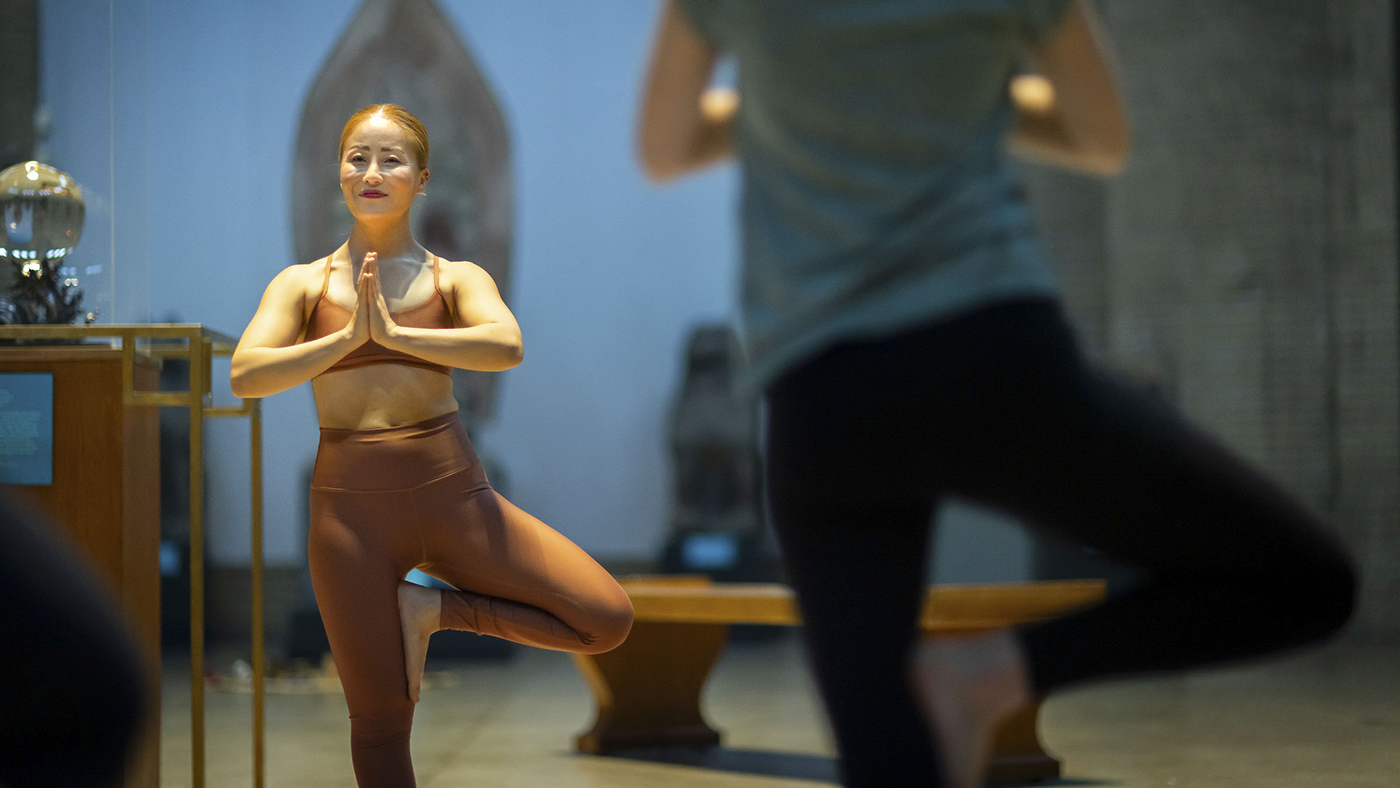Mind & Mood Recharge, Powered by Penn Medicine, Centers Wellness in Museum Experience

PHILADELPHIA—The Penn Museum is placing well-being at the heart of a museum experience, in partnership with Penn Medicine. Offered every first Wednesday, 5:00 to 8:00 pm from November 1, 2023 to March 6, 2024, Mind & Mood Recharge, powered by Penn Medicine, is a new after-hours program designed to reset busy work weeks with restorative mind and body practices such as yoga in the galleries, sound bath meditation, art-making therapy, plus a Botanical Bar serving nutritious refreshments.
On opening night, November 1, the first 150 guests will receive a complimentary calming strip and a limited-edition sleep mask featuring a wedjat—the eye of Horus, believed to be the ancient origin of the modern Rx symbol.
Admission is free for Penn Museum members, as well as Penn Medicine patients and staff, who will be able to enter a code at online checkout or show ID at walk up. For the general public, access to Mind & Mood Recharge is included with $18 general admission for after-hours access to all Museum galleries and exhibitions.
“Museums can be spaces for healing and restoration,” says Dr. Christopher Woods, Williams Director at the Penn Museum. “Many of our artifacts and contemporary objects represent living traditions of wellness that have been part of human culture for centuries. Mind & Mood Recharge highlights our ever-evolving pursuit of health, and there is no better partner than Penn Medicine with whom to bring this program to life.”
Every first Wednesday, attendees can enjoy a:
- Museum Rx Self-Guided Tour, which offers a chance to learn about history and embrace healthy habits. Visitors can clock their steps by completing all the stops in this gallery tour highlighting objects connected to the history of medicine and healing across 10,000 years.
- Botanical Bar serving herb-infused cocktails (with non-alcoholic options), plus nutritious small bites and refreshments for purchase.
- Wellness Marketplace with gifts, crafts, and services offered by local health-centric professionals and alternative practitioners
A monthly rotation of wellness activities will also be offered, such as:
- All-Levels Yoga Classes inside the Museum’s galleries led by Philadelphia-based instructors Eunmi Chang; teachers from Three Queens Yoga, whose studio practice is grounded in equity, social justice, and community; and Penn Recreation. No experience is necessary.
- Healing Sound Bath Meditation, a deeply relaxing and meditative journey of healing and self-discovery involving Tibetan singing bowls known to stimulate the immune system and changes in brain waves, leading to a deep sense of peace and well-being.
- Immersive Art-Making Therapy led by Shanina Dionna, a certified person-centered expressive arts facilitator, who will guide participants through meditation, breath work, intention setting, dance/movement, mindfulness, empathetic understanding, and unconditional positive regard.
The complete line-up of dates and activities can be found here.
“In health care, our work is challenging yet rewarding. It is important to remember that we must take care of ourselves so that we can take care of others,” said Kevin B. Mahoney, Chief Executive Officer of the University of Pennsylvania Health System. “We’re proud to partner with our neighbors at the Penn Museum to offer tools directed at restorative well- being and resilience. This new museum experience holds special benefits for our health care providers and their patients, as well as staff across the Penn Medicine system."
###
About the Penn Museum
The Penn Museum’s mission is to be a center for inquiry and the ongoing exploration of humanity for our University of Pennsylvania, regional, national, and global communities, following ethical standards and practices.
Through conducting research, stewarding collections, creating learning opportunities, sharing stories, and creating experiences that expand access to archaeology and anthropology, the Museum builds empathy and connections across diverse cultures
The Penn Museum is open Tuesday-Sunday, 10:00 am-5:00 pm. It is open until 8:00 pm on first Wednesdays of the month. The Café is open Tuesday-Thursday, 9:00 am-3:00 pm and Friday and Saturday, 10:00 am-3:00 pm. On Sundays, the Café is open 10:30 am-2:30 pm. For information, visit www.penn.museum, call 215.898.4000, or follow @PennMuseum on social media.
Hero photo is available for download here
About Penn Medicine
Penn Medicine is one of the world’s leading academic medical centers, dedicated to the related missions of medical education, biomedical research, excellence in patient care, and community service. The organization consists of the University of Pennsylvania Health System and Penn’s
Raymond and Ruth Perelman School of Medicine, founded in 1765 as the nation’s first medical school.
The Perelman School of Medicine is consistently among the nation's top recipients of funding from the National Institutes of Health, with $550 million awarded in the 2022 fiscal year. Home to a proud history of “firsts” in medicine, Penn Medicine teams have pioneered discoveries and innovations that have shaped modern medicine, including recent breakthroughs such as CAR T cell therapy for cancer and the mRNA technology used in COVID-19 vaccines.
The University of Pennsylvania Health System’s patient care facilities stretch from the Susquehanna River in Pennsylvania to the New Jersey shore. These include the Hospital of the University of Pennsylvania, Penn Presbyterian Medical Center, Chester County Hospital, Lancaster General Health, Penn Medicine Princeton Health, and Pennsylvania Hospital—the nation’s first hospital, founded in 1751. Additional facilities and enterprises include Good Shepherd Penn Partners, Penn Medicine at Home, Lancaster Behavioral Health Hospital, and Princeton House Behavioral Health, among others.
Penn Medicine is an $11.1 billion enterprise powered by more than 49,000 talented faculty and staff.



